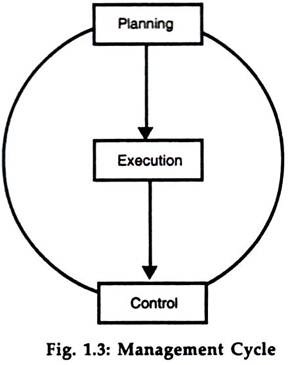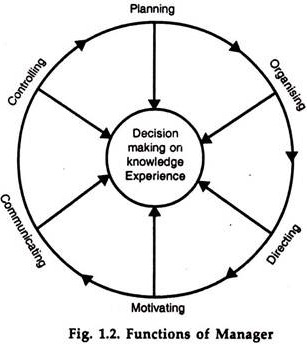This article throws light upon the top eight functions of management. The functions are: 1. Planning 2. Organising 3. Staffing 4. Directing 5. Motivating 6. Controlling 7. Co-Ordination 8. Communication.
Function # 1. Planning:
When management is reviewed as a process, planning is the first function performed by a manager. The work of a manager begins with the setting of objectives of the organisation and goals in each area of the business.
This is done through planning. A manager probes the present to find where he is and he then forecasts future objectives which will indicate where he wants to be, i.e., the destination to be reached. The alternatives to achieve the objectives are evaluated and the selected alternative becomes the plan of action.
Once the plan is formulated, the manager has to indicate the objectives of the plan and steps to be taken by his subordinates. By communicating he makes the objectives effective. In practice, planning function is all-pervading.
ADVERTISEMENTS:
It is involved in all other managerial functions. For example, budget is a part of planning as well as an instrument of control. Planning makes things happen that would not otherwise occur. Planning includes objectives, strategies, policies, procedures, programmes, etc., as it involves making choices, decision making is the heart of planning.
Function # 2. Organising:
Managing a business is not just planning. It includes putting life into the plan by bringing together the executive personnel, workers, capital, machinery, materials, physical facilities and other things or services to execute the plans. When these resources are assembled the enterprise comes to life.
Organising involves determining and noting activities needed to fulfil the objectives, grouping these activities into manageable units or departments, and assigning such groups of activities to managers. Delegation of authority creates an organisation. It determines authority-responsibility relationship. These relationships must be properly co-ordinated to secure unity of organisation.
Function # 3. Staffing:
Staffing involves filling the positions needed in the organisation structure by appointing competent and qualified persons for the jobs. This needs man-power planning and man-power management. We have scientific selection and training of personnel.
ADVERTISEMENTS:
We have to provide suitable methods of remuneration and performance appraisal. Much of the work relating to human resource planning and management is delegated to a personnel manager. However, top management is ultimately responsible for all activities relating to staffing.
Function # 4. Directing:
Some management experts prefer leading in place of directing particularly under a democratic managerial set up. The function of leading has been termed motivating, directing, guiding, stimulating and actuating. This managerial function is directly concerned with the human factors of an organisation.
A manager by leadership and motivation has to direct and guide all subordinates and get the work done through people. Direction involves managing managers, managing workers and the work through the means of motivation, proper leadership, effective communication as well as co-ordination.
A manager must develop the ability to command. He must know how to direct others, i.e., how to issue orders and instructions, without arousing resentment or offence and he must be able to secure willing obedience from his subordinates without destroying their initiative and creativity.
Function # 5. Motivating:
ADVERTISEMENTS:
This managerial function is fully reflected when we define management as the art of getting things done willingly through and with other people.
Management is interested in two primary elements:
(1) Things, i.e., material resources and
(2) Men and women, i.e., human resources.
ADVERTISEMENTS:
Thing is subject to the laws of mechanics and it is susceptible to scientific or machine-like treatment. But human beings cannot be subjected to scientific or machinelike treatment. However, through the power of leadership and the science of co-operation, we can evolve a suitable method of integrating the interests of individuals and the organisation.
The power of management exists with or through people, but never over them, at least in a democratic society. Authority may be imposed from above but it must be supported, nourished and recognised from below, i.e., from the subordinates. Then only the authority is meaningful and it can work smoothly.
The managerial power has its source in the methods of leading, motivating, appraising, teaching, influencing, counseling, coaching, delegating and setting an example. So the manager plans, organises, directs, and motivates the people working with him. Motivation and leadership are the master keys to successful management of any enterprise.
They are also responsible to ensure productivity of human resources. Motivation can set into motion a person to carry out certain activity. Motivation assumes unique importance in modern business management. Democratic leadership heavily relies on motivation of employees, through financial and non-financial incentives.
ADVERTISEMENTS:
Human relations in industry have accorded special emphasis to this managerial function. Effective communication and participation enhance the power of motivation. Feedback of information (upward communication) is necessary for effective motivation and direction.
Function # 6. Controlling:
Controlling is the last phase of the management process. Control is the process of measuring actual results or present performance, comparing those results to plans or some standard of performance, finding the reason for deviations of actual from desired result and taking corrective action when necessary.
The corrective action may lead to a change in the method of implementation of the plan or change in the plan itself or even a change in the objective. Usually our desired performance standards are the objectives, policies, programmes, procedures and budgets.
There are three important elements in the total management cycle or system:
ADVERTISEMENTS:
(1) Planning,
(2) Implementation (action) of the plan and
(3) Control.
The entire planning-action-control process in management is repetitive. The control process generates information for modification or even creation of new plans.
ADVERTISEMENTS:
Planning is followed by action, then by review and control in order to achieve the desired result.
Complete operating cycle or planning control cycle includes:
(1) Objectives,
(2) Planning,
(3) Action,
(4) Accomplishment,
ADVERTISEMENTS:
(5) Feedback of Information and
(6) Mechanism of Control. Good management adopts this cycle and assures not only survival but also promotes growth.
Control Mechanism:
A manager must adopt the following steps in controlling:
(1) Identify potential problems,
ADVERTISEMENTS:
(2) Select mode of control,
(3) Audit, measure and evaluate performance in terms of planning,
(4) Spot significant deviations.
(5) Ascertain causes of deviations,
(6) Take remedial measures,
(7) Ensure accomplishment of targets.
Function # 7. Co-Ordination:
ADVERTISEMENTS:
Each managerial function is an exercise in co-ordination. It is said that co-ordination is the essence of management. It is an integral plan of direction. Coordination is concerned with harmonious and unified action directed toward a common objective. It involves inter-relating various parts of the work or organisation.
It is not a separate activity but a condition that should diffuse itself through all phases of the management process. Co-ordination is an orderly arrangement of group efforts to provide unity of action.
It ensures that all groups and persons work efficiently, economically and in harmony. Co-ordination can be accomplished automatically if we have sound objectives, policies, procedures and programmes and a sound organisation structure.
Coordination is essential in a large organisation because we have:
(1) Multiple and complex activities,
(2) Complex and elaborate organisation structure,
ADVERTISEMENTS:
(3) Multiple levels of management due to limited span of control, and
(4) Acute division of labour leading to increasing use of specialists.
A manager must co-ordinate the work for which he is accountable by balancing, timing, and integrating the work. Such efforts at co-ordination are required at all levels of management.
Board of Directors, managing directors, heads of divisions and/or departments are the usual agencies of co-ordination to develop an orderly and integrated pattern of group efforts in proper sequence and at proper time. Co-ordination requires effective channels of communication. Person-to-person communication is most effective for co-ordination.
Function # 8. Communication:
In its broadest sense, communication is the transmission of meaning to others. It means transfer of information and understanding from person to person a flow of information from the top to the bottom and from the bottom to the top as well as horizontal or sideways on the same level of organisation.
In formal communication we have dissemination of information primarily. In biter-personal communication between two or more persons we have transmission of information as well as flow of understanding based on two-way traffic of communication.
ADVERTISEMENTS:
Personal or face-to-face communication is the best form of communication. Managerial leadership depends upon upward communication to the leader in the form of feedback so that he can understand the feelings, emotions, motives and problems of subordinates and his power will have support and acceptance from below.
Communication also leads to sharing of information, ideas and knowledge. Communication is the cement that makes organisations. It enables a group to think together, and act together. Society’s very existence is dependent upon communication, i.e., passing of information and understanding from one person to another.
Communication may be through:
(i) Actions, e.g., smile, frown, facial expressions;
(ii) Spoken words, e.g. talk;
(iii) Written or printed words;
(iv) Graphs, diagrams, figures, models, pictures, charts and tables;
(v) Silence can also communicate at times.
The elements of management —planning, organising, staffing, directing, motivating and controlling — rare universally applicable to all joint or collective enterprises.
In short management involves:
(1) Managing the enterprise;
(2) Managing the managers, and
(3) Managing the workers and the work.
Central Framework of Management system:
1. Top Bar — Organisation.
2. Right Bar — Communication.
3. Left Bar — Human Relation.
No organised activity could exist for long without the holy three of the Bicycle. A manager has to use the central frame effectively.
Supporting Mechanism to Management System:
(1) Rear Wheel:
It represents Technical know how — administrative office, plant, personnel, marketing, purchasing, finance, planning and research
(2) Front Wheel:
It represents managerial function — planning, organising, directing, controlling, etc., the manager provides the motive power to run the wheels of business enterprise. He is also the coordinating and controlling authority.
(3) The Head-lamp represents goals and objectives to be achieved.
(4) On the carrier we have goods and services required in the market.
(5) Roadway for business journey indicates economic, social and political factors.
Planning concentrates on setting and achieving objectives of an organisation. Planning is the first management function to be performed in the process of management. It governs survival, growth and prosperity of any organisation in a competitive and ever-changing environment the planning function is performed by managers at every level of management. It is necessary for discharging all other management functions also.

